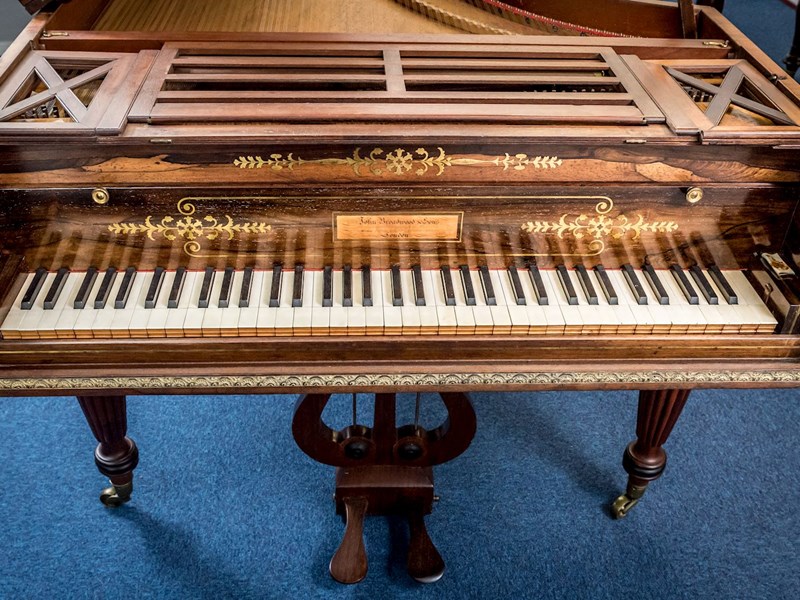Piano expert Nigel Scaife’s business – The Piano Shop in Eridge – is described by his customers as an ‘Aladdin’s Cave’ as it is so full of all types of pianos – modern uprights, vintage baby grands, digital varieties, and rare finds from some of the world’s best known brands, including Bechstein, Bluthner and Steinway.
It is a veritable treasure trove for any pianist or an aspiring one.
‘Having a good piano to play and practise on is vital to the enjoyment of making music and to progress as a musician,’ declares Nigel, and this is obviously what has fuelled his passion for both playing and also collecting pianos over the years.
He has had some rather interesting historical discoveries, too, including a pre-second world war Steinway piano with an envelope containing an assortment of fascinating musical memorabilia.
But his most recent find was the extraordinary Broadwood grand which was originally delivered to King George IV at the Royal Pavilion Brighton on December 21, 1821.
Nigel came across it at the Colt Collection auction in Canterbury last month: ‘I was thrilled to be able to buy this instrument and still can’t quite believe that I have the responsibility of making sure it is restored in the best and most historically informed way possible,’ he says.
‘This is a remarkable instrument made of solid rosewood and profusely inlaid with brass decoration. It cost the King £165 guineas – a small fortune at the time, even for a monarch! George was a generous patron of the arts and an enthusiastic musician himself, so I’m sure it would have been played a great deal in its early years at the Royal Pavilion.’
Nigel adds that it is ‘very similar’ to the piano Thomas Broadwood gave to Beethoven in 1818. ‘It is also one of the last pianos built by Broadwood & Sons that doesn’t have any iron to strengthen the frame,’ he explains.
‘This makes it perfect for playing any classical repertoire up to and including Beethoven’s late piano sonatas in an authentic manner. It is the quintessential English fortepiano.’
So how did the piano come into Charles F. Colt’s possession? ‘He bought it during the second World War for £10 from Sebastian Morley, of harp fame,’ reveals Nigel.
He goes on to say that Colt may have got it playing ‘reasonably well’ at some point, but it will take some further restoration.
‘Times have changed, and the restoration techniques used in his day are not necessarily those which are now considered historically informed or ‘best practice’. We’re going to take a ‘restorative conservation’ approach.
‘This restoration project will probably take several years to complete, but to give this remarkable piano a new lease of life will be hugely rewarding.’
As well as the physical restoration, Nigel says he is looking forward to finding out more about the Broadwood grand’s journey from the court of King George IV to his workshop in Eridge.
‘Its story will be fascinating to research as we know that it was taken to Windsor Castle in the late 1820s. But how long did it remain there?
Who owned it once it had left its royal home? There are so many discoveries to be made!’








